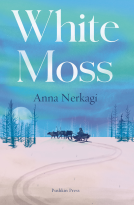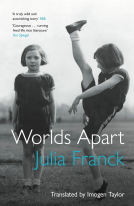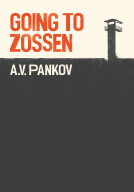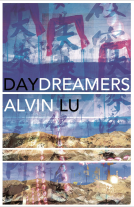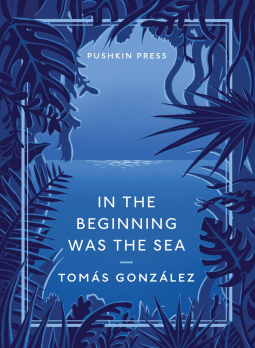
In the Beginning Was the Sea
by Tomas Gonzalez
This title was previously available on NetGalley and is now archived.
Send NetGalley books directly to your Kindle or Kindle app
1
To read on a Kindle or Kindle app, please add kindle@netgalley.com as an approved email address to receive files in your Amazon account. Click here for step-by-step instructions.
2
Also find your Kindle email address within your Amazon account, and enter it here.
Pub Date Feb 24 2015 | Archive Date Dec 24 2014
Steerforth Press | Pushkin Collection
Description
Pushkin Collection editions feature a spare, elegant series style and superior, durable components. The Collection is typeset in Monotype Baskerville, litho-printed on Munken Premium White Paper and notch-bound by the independently owned printer TJ International in Padstow. The covers, with French flaps, are printed on Colorplan Pristine White Paper. Both paper and cover board are acid-free and Forest Stewardship Council (FSC) certified.
Marketing Plan
Dedicated US-based publicist to handle North American campaignAggressive outreach to US media -- trade, general interest and Latino interest -- for this major writer being translated into English for the first time.ARC's to Indie accounts, Indie Next push.Submission to Discover Great New Writers.
Available Editions
| EDITION | Other Format |
| ISBN | 9781782270416 |
| PRICE | $18.00 (USD) |
Average rating from 12 members
Featured Reviews
 Educator 211653
Educator 211653
Thank you Net Galley. I enjoyed this book . The writing is beautiful, lyrical The book does not rely on surprises to keep you engrossed. You know what is happening, how and why it is happening, and you are still engrossed because of the beautiful prose. I shall definitely be looking for more of Gonzalez's work.
 Mandy J, Reviewer
Mandy J, Reviewer
J and Elena decide to leave their frenetic city existence of drinking and parties to embrace the good life on a remote tropical island. But their dreams soon turn to nightmares as their hoped for paradise fails to work out. We know almost from the start that there is tragedy ahead. Gonzalez cleverly and effectively foreshadows the disaster to come without sacrificing any tension or suspense. We hear very near the beginning of the book of the room “where the corpse would be laid out”, and “the first of the two winters J would spend on the finca, the first of his last two winters on earth.” The sense of menace continues to grow as the couple try against all odds to make their new venture succeed and although neither of them is a sympathetic character the reader is soon involved in their journey.
This is a marvellously taut novel, atmospheric and unsettling, with a sustained narrative voice that never falters. The prose is spare with excellent descriptions of the heat and decay and native life on the island. Gonzalez is a Columbian writer and although this novel was first published in Spanish over 30 years ago this is the first time it has been translated – and very well translated – into English. It feels raw and visceral, and it came as no surprise to learn that it is based on what happened to Juan, the author’s brother. Gonzalez came to feel that only by writing about it all would he be able to come to terms with what happened. Knowing the biographical background only enhances the effect the book had on me – although it is by no means necessary to know it to enjoy this haunting and dramatic novel. Highly recommended.
 Juli R, Reviewer
Juli R, Reviewer
I picked this novel up on a whim after reading the blurb. There was something fascinating about it and the idea that it was based on a true story also intrigued me. I am incredibly happy to have picked up this novel and discovered a new author for myself! Thank you to Netgally for providing me with a free copy of this novel.
In the Beginning was the Sea is a really interesting read. On the one hand the reader is kept on the outside, observing J. and Elena as they live, and ruin, their lives, while on the other hand the reader can't help but become affected by what they do. J. and Elena buy their farm, or finca as it's referred to in the book, and want to live a life away from the materialism and fakery of the materialism that surrounded them in the city. Naturally, things don't go as they had planned. González has the ability to write about the nastiness of humanity and life in a tone that is beautifully calm, making the tragedy of his characters seem both inevitable and due to willfulness. A major part of this novel is the idea of reinventing yourself, of choosing a new lifestyle and adapting to your surroundings. The novel plays with the way in which the story of J. and Elena is told which presents the reader with a sense of doom about their journey.
There is something about In the Beginning was the Sea that doesn't feel comfortable. González was inspired for this book by his own brother's life, yet the book is largely devoid of overt sentimentality. There is something almost cruel in how the narrator deals with his characters, the lassitude with which he pictures their rise and downfalls. The reader knows much more than the characters do and as a consequence the book almost feels like a detective novel at times. The ending is, if not clear, at least expected, and it's fascinating to see how González works his way towards the end at his own leisure. The contempt shown by the main characters is one that is returned to them and in the end the reader is simply left wondering how it got to this.
Despite this being González's first book, the writing is stunning and has a clear voice. His descriptions of the finca and of the sea are beautiful and emotive and more than anything bring out the ecological fantasies of the main character. What I really enjoyed was how he would foreshadow certain events but then not reveal anything about them. González manages to keep the reader right on the edge while bathing them in beautiful imagery and writing. Frank Wynne does an amazing job at translating González's prose. Especially enjoyable were the words he left in Spanish, such as 'finca' and 'hermana', which added a lot of flavor to the book. For a long time he was known as 'the best-kept secret of Colombian literature', but it is long overdue that his books are being translated.
In the Beginning was the Sea is a novel that I won't quickly forget it. Reading it was almost addictive in a strange sense and after finishing it I still hadn't made up my mind about it. It will keep you on the edge of your seat for as long as it lasts, largely due to González's stunning prose. The book will leave you with questions but also with a sense of understanding which is hard to explain. I would recommend this to fans of realist and Spanish fiction.
 Andrija F, Educator
Andrija F, Educator
*In the Beginning Was the Sea* by Tomás González is a novel that tells the story of a man who moves with his family from the city to a rural area in Colombia in search of a new beginning. Set against the backdrop of the lush and challenging landscape, the novel explores themes of displacement, personal transformation, and the search for meaning in a seemingly inhospitable environment. González’s narrative is rich with vivid descriptions of the natural world and delves into the inner lives of the characters as they confront their pasts and adapt to their new surroundings. The novel offers a poignant examination of how individuals and families grapple with change and the impact of their surroundings on their lives and relationships.
Readers who liked this book also liked:
Cecilia Eudave
General Fiction (Adult), Literary Fiction, Multicultural Interest
